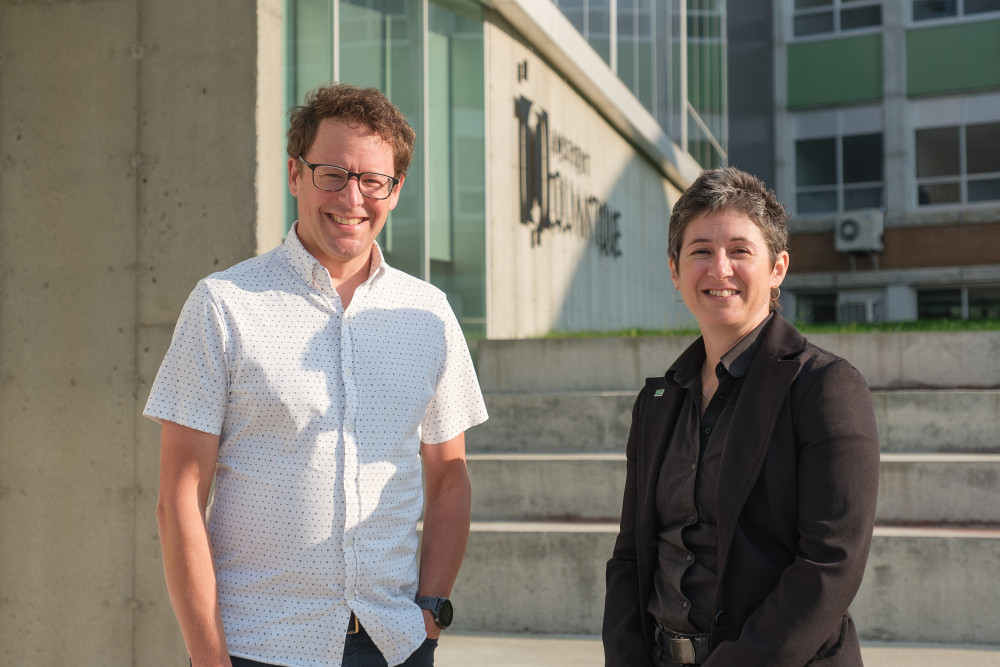
Photo: Michel Caron – UdeS
Even if the quantum computer remains an enigma for the general population, Professor Isabelle Lacroix and Professor Alexandre Blais have long wanted to open a dialogue about its integration into our societies. With colleagues from the humanities, law, engineering and the Quantum Institute, they reiterate that we must “see the arrival of quantum technologies” and move quickly on this fundamental work.
Funded as part of the STIMuleS program of the Fonds de recherche du Québec – Nature et technology (FRQNT), in partnership with the Ministry of the Economy, Innovation and Energy (MEIE), at a rate of USD 300,000 per year over 3 years, their research project to develop good practices for inclusive social the dialogue begins these days and comes at the right time.
“Everything that has been happening for years around artificial intelligence has made us even more aware. In the case of quantum technologies, it is all the more urgent, if we want the dialogue to be really early, to start this work,” says Professor Isabelle Lacroix.
Professor Lacroix, who works at both the Quantum Institute and the Faculty of Letters and Humanities, has been setting the table for this dialogue for some time. The research project will enable him to advance his work by working directly with all stakeholders, from high-tech industry, academia, to decision-makers, civil society and potential users of technologies.
“Over the years, numerous testimonies from our teaching and research practice have revealed the need to create concrete tools to facilitate researchers in considering the social impacts of technological development. This could result, for example, in a network for ethical reflection or self-sustaining online training for a PhD student that seeks to anticipate the concerns of potential users,” explains Professor Lacroix.
The support tools created during the project will have every prospect of implementation since they will be co-constructed from the reality of university research and entrepreneurial development, taking into account the possible social effects associated with technology adoption.
The acceleration of discovery in our field and the changes it could cause call for both the scientific community and partners to immediately integrate ethical considerations into research and potential applications. These ethical considerations will help us ensure that the fruits of our discoveries are put to the service of the common good.
Professor Alexandre Blais
A culture of cooperation that needs to be maintained and promoted
For now, the most significant benefits of this project will first materialize within the Sherbrooke Innovation Zone since the local dialogue carried out should ensure the creation of a wider community and networking of innovative practices responsible for technological development.
“Research funding is the basis for the development of quantum technologies, and DistriQ ensures the creation of bridges between this research and companies using quantum solutions, therefore the development is framed in an ethical way for socially responsible innovation,” said Richard St-Pierre, CEO of DistriQ . , the zone of quantum innovation.
A valuable resource for high school graduates
If responsible technology development practices are critical to research communities and technology companies, the research team also wants to see them integrated into training approaches as soon as possible. For example, a training module on responsible technological development for undergraduate students will be designed and integrated into a mandatory course in the bachelor’s degree in quantum information sciences at UdeS.
For graduate students at the Quantum Institute, they will be able to develop skills related to the implementation of participatory processes, as well as expertise applied to knowledge transfer through awareness and training tools. They will be at the forefront of progress in the social effects of disruptive technologies.
This dialogue that we want to establish within the Innovation Zone, professors Lacroix and Blais especially want to be sustainable so that the research community, companies and representatives of society can keep it alive and adapt practices in real time, as technology advances and new concerns emerge.
The project was initially designed with quantum technologies in mind, but the research team’s approach could become a model.
“Will our work be able to be adapted and transferred to some other disruptive technology? We want that and we will work with that in mind,” says Professor Isabelle Lacroix.
The dialogue established by professors Blais and Lacroix has already brought together several collaborators:
Other partners should be added to the project.

